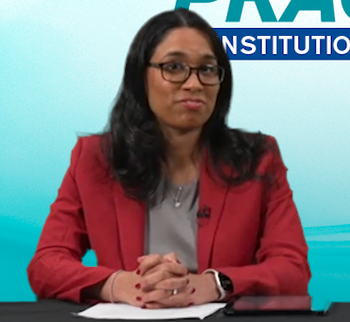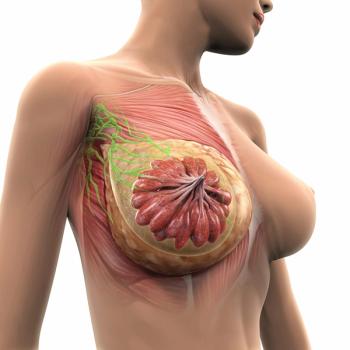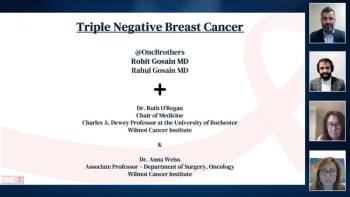
Breast Cancer
Latest News
Latest Videos

CME Content
More News

Rani Bansal, MD, discusses the case of a 54-year-old post-menopausal patient who develops liver and brain metastases after undergoing prior therapy with trastuzumab/pertuzumab and T-DM1.

Heather Moore, CPP, PharmD examines the role of topical diclofenac gel in the management of hand and foot syndrome associated with capecitabine, highlighting key insights from the D-TORCH trial.

Heather Moore, CPP, PharmD, shares expert insights on the effective management of adverse effects related to tucatinib and other HER2 tyrosine kinase inhibitors (TKIs).

As the 41st Annual Miami Breast Cancer Conference approaches, Debu Tripathy, MD, prepares to step down as cochair.

A patient reported outcome analysis of the phase 3 OlympiA trial found that treatment-emergent symptoms were easily resolved after treatment with olaparib for BRCA1/2 high-risk HER2-negative breast cancer ended.

The National Comprehensive Cancer Network has issued a category 2A recommendation for the use of goserelin for ovarian function suppression in those with breast cancer.

Carey Anders, MD, offers insights into the BRIDGET trial, a study investigating the role of tucatinib in the prevention of secondary brain metastases in patients with advanced HER2-positive breast cancer.

Carey Anders, MD, examines strategies for treating stable and active brain metastases in individuals with advanced HER2-positive breast cancer, highlighting key data from the HER2CLIMB trial.

Carey Anders, MD, discusses the scenario of a 34-year-old patient diagnosed with HER2-positive breast cancer, who develops brain metastases after undergoing initial therapy with dual HER2 blockade.

Heather Moore, CPP, PharmD, presents a comprehensive summary of targeted therapies for HER2-positive breast cancer and provides expert insights into the management of adverse effects associated with these treatments.

Virginia Kaklamani, MD, offers clinical insights on treatment toxicity considerations in HR+ breast cancer, and the Oncology Brothers outline key takeaways from the discussion.

Medical oncologists provide comprehensive insights on the standard-of-care treatment practices for patients with advanced/metastatic HR+ breast cancer.

The Oncology Brothers and Virginia Kaklamani, MD, outline the treatment algorithm for patients with locally advanced HR+ breast cancer.

Virginia Kaklamani, MD, joins Rohit Gosain, MD, and Rahul Gosain, MD, to discuss treatment paradigms for patients with early-stage HR+ breast cancer, highlighting the differences in treatment for premenopausal and postmenopausal patients.

The final overall survival analysis of trilaciclib plus chemotherapy in patients with metastatic triple-negative breast cancer as part of the PRESERVE 2 trial will take place in the third quarter of 2024.

Susan Dent, MD, delves into treatment approaches for triple-positive breast cancer in the second-line and beyond, highlighting findings from the DESTINY-Breast03 trial.

Carey Anders, MD, and Susan Dent, MD, discuss the role of radiotherapy in patients with HER2-positive breast cancer and brain metastases.

Treatment with second-line vepdegestrant in those with advanced breast cancer is currently under evaluation as part of the phase 3 VERITAC-2 trial.

Screening frequency appears to be a weak risk factor for advanced breast cancer, with obesity in post-menopausal and dense breasts in pre-menopausal patients being more prominent factors.

Harold J. Burstein, MD, PhD, discusses the management of adverse events in patients with HER2+ breast cancer, and the Oncology Brothers provide closing thoughts on the entire discussion.

Medical oncologists discuss the various treatment options for patients with metastatic HER2+ breast cancer and where they fit into the treatment algorithm.

The Oncology Brothers and Harold J. Burstein, MD, PhD, discuss clinical approaches to treating patients with locally advanced HER2+ breast cancer.

Harold J. Burstein, MD, PhD, joins the Oncology Brothers, Rahul Gosain, MD, and Rohit Gosain, MD, to provide clinical insights on treatment practices for patients with early-stage HER2+ breast cancer.

High-grade adverse effects with zanidatamab plus palbociclib and fulvestrant seem to be uncommon in patients with HER2-positive, hormone receptor–positive, metastatic breast cancer, according to Sara Hurvitz, MD, FACP.

A panel of medical oncologists provides insights on managing toxicities in patients with triple-negative breast cancer who are receiving antibody-drug conjugates.





































